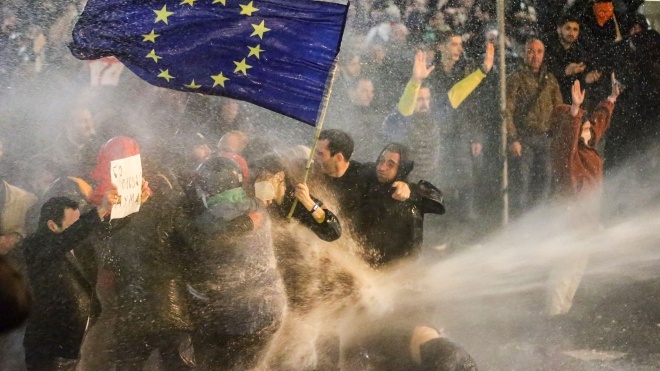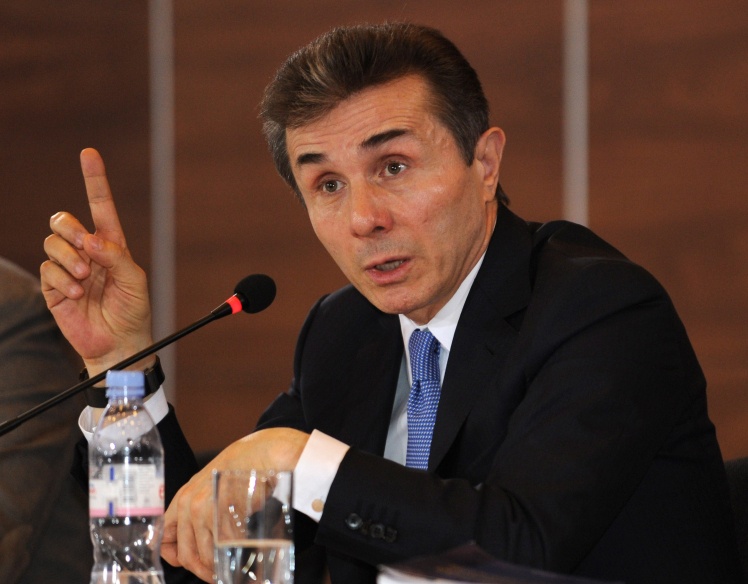The draft law "On transparency of foreign influence" was submitted to the parliament for consideration in February this year. It proposes to create a register of "agents of foreign influence", which will include non-governmental organizations and mass media that receive at least 20% of their funding from abroad. If the organization refuses to register as an agent of foreign influence, it faces a fine of up to 25 thousand lari (€8.8 thousand). Agents of foreign influence must file declarations every year. They are also prohibited from receiving any information from civil servants.
On March 7, the parliament supported this draft law in the first reading. The final vote should take place on March 9. At the same time, the deputies have to discuss another draft law — "On the registration of foreign agents". It is stricter than the first one — according to it, any person or legal entity can be recognized as a foreign agent, not only mass media or non-profit organizations. Also, this project introduces criminal liability and mandatory marking that a person is a foreign agent.
The authors of the bills are former deputies of the ruling party "Georgian Dream", who created their own movement "Peopleʼs Power". They call themselves the opposition to the "Georgian Dream", but they also adhere to anti-Western rhetoric — for example, they say that the West "wants to involve Georgia in the war in Ukraine." This also became one of the arguments of the draft laws on foreign agents — in "Peopleʼs Power" they say that it is necessary to oppose the "propaganda of liberal ideology" and "the desire of the West to drag Georgia into war." Georgian media claim that "Peopleʼs Power" is entirely a project of the ruling party. Parliamentary elections will be held in the country in 2024. According to journalists, in the last six months, "Georgian Dream" began to gradually lose supporters. Therefore, it was important for the party to create a satellite that would attract conservative votes. "Georgian Dream" denies that they are somehow related to "Peopleʼs Power", but emphasizes that their views coincide in many aspects.
The draft laws were criticized by human rights activists, journalists, oppositionists, Europe and the USA. It is called a copy of the Russian law on foreign agents. Non-profit organizations and the media came out with statements that the laws are anti-democratic and unconstitutional, and also become obstacles to the European integration of Georgia, which (as in Ukraine) is enshrined in the constitution as a priority. The head of the European Parliament, Josep Borrell, said that these draft laws could stop Georgiaʼs European integration. In the USA, March 7 was called "the black day of Georgian democracy". "Georgian Dream" and "Peopleʼs Power" representatives donʼt agree with the "Russian trace" and claim that they took the American experience of fighting foreign agents as a basis. "No one explains why it [the draft law] is Russian, how it differs from, for example, the American one. If it works well in the US, why canʼt it work in Georgia?" — said the general secretary of "Georgian Dream" and the mayor of Tbilisi Kakha Kaladze.
The current situation is a continuation of the political crisis in Georgia, which has been going on for several years. “Georgian Dream”, founded by oligarch Bidzina Ivanishvili, has held power in Georgia for more than ten years. The partyʼs ideology is based on the countryʼs European path, but in recent years, "Georgian Dream" has drifted more and more towards cooperation with Russia. In 2019, a Russian delegation spoke in the Tbilisi parliament, which provoked mass protests in the country. The police dispersed the protests and arrested one of the opposition leaders, Nika Melia. In response to anti-Russian protests, Russia stopped direct flights with Georgia.
Bidzina Ivanishvili.
Getty Images / «Babel'»
In 2020, parliamentary elections were held in the country, in which "Georgian Dream" won again. The opposition called these elections falsified and boycotted the parliamentary session. The plan to get out of the situation was proposed by the President of the European Council, Charles Michel, at the end of 2020. According to it, the authorities were supposed to release oppositionist Nika Melia, implement judicial reforms and hold extraordinary parliamentary elections in 2022, if “Georgian Dream” won less than 43% of the vote in the 2021 local elections. The opposition, in turn, had to stop boycotting the parliament. But in the summer of 2021, “Georgian Dream” announced that it was withdrawing from the agreement. According to Georgian journalists from the independent publication “Jam News”, this was a signal that the ruling party is allowing itself to criticize the West more and more often.
The confrontation between the conservative part of the population and the liberals has intensified in the country. In 2021, conservatives and far-rights brutally beat journalists and participants of Tbilisi Pride. Against this background, pro-Russian movements began to emerge, which do not support Western integration and advocate friendship with Russia as a "defender of traditional values." The main one is the “Alt-info” movement, which has its own media and, according to Georgian journalists, is sponsored by the Kremlin.
The arrest of Mikheil Saakashvili and the war in Ukraine only increased the differences between the EU, the USA and Georgia. Saakashvili returned to the country in 2021, hoping that his arrival would mobilize opposition supporters and help it win local elections. The politician was immediately arrested and sentenced to six years in prison for "abuse of official authority". In prison, Saakashvili went on a hunger strike, and his health deteriorated significantly. Europe and Ukraine demand that Georgia release the politician, but the ruling party has repeatedly stated that this is impossible.
After the Russian invasion on February 24, 2022, Georgia took a neutral position. The government condemned the invasion and supports all pro-Ukrainian resolutions, but refused to impose sanctions against Russia. Georgia also refuses to supply military aid to Ukraine. "Taking sides in Russiaʼs war of occupation is not in the interest of Georgia, we will support peace," said Mamuka Mdinaradze, head of the “Georgian Dream” parliamentary faction. After the 2008 war, Georgia is trying to restore partnership relations with Russia. Since 2014, Russia lifted the ban on the import of Georgian goods, and in 2021 it became the main supplier of coal to the country. The State Statistics Service of Georgia reported that the turnover between the countries increased by half in six months of 2022. Georgia is also suspected of importing sanctioned goods into Russia, including electronics. On pro-Russian Georgian sites, such as the “Alt-info” TV channel and website, they promoted the idea that "Europe will freeze without Russian gas," and Western countriesʼ support for Ukraine is weak.
Russians are also fleeing to Georgia, who are afraid of falling under Russian mobilization. According to official data, since February 24, 112 thousand citizens of the Russian Federation have moved to the country. Many of them buy real estate there. President Salome Zurabishvili said that it might be worth making entry for Russians more strict, but “Georgian Dream” stated that they do not see Russians as a threat to the country. Meanwhile, the Georgian opposition is unhappy with the fact that Russian schools are opening in the country. Georgians themselves distrust the arrival of Russians — polls show that 78% of respondents are against the visa-free regime, under which Russians can stay in the country for a year without any additional documents.
Salome Zurabishvili.
Getty Images / «Babel'»
Protests in Georgia will obviously continue — but it is unlikely to affect the politics of the “Georgian Dream”. Bills on foreign agents should be sent to the Venice Commission for consideration after the vote, but "Georgian Dream" already says that they will be approved anyway, even if the commission has comments. The current situation can help the opposition to mobilize supporters and turn the tide in next yearʼs elections in its favor. "Yesterdayʼs protest was not organized by any political force, political party. I donʼt think people should be stopped or that anything will stop them. We will fight, no one [from the opposition] has a clear calendar plan of what to do at the moment, we only clearly understand that we will not surrender our state," says one of the leaders of the Georgian opposition and the former head of the National Police in Ukraine, Khatia Dekanoidze. Georgian President Salome Zurabishvili said she would veto the law if it was passed.
Translated from Ukrainian by Anton Semyzhenko.
Support Babel to help us explain more: 🔸 in hryvnia 🔸 in cryptocurrency 🔸 via Patreon 🔸 or PayPal: [email protected].

